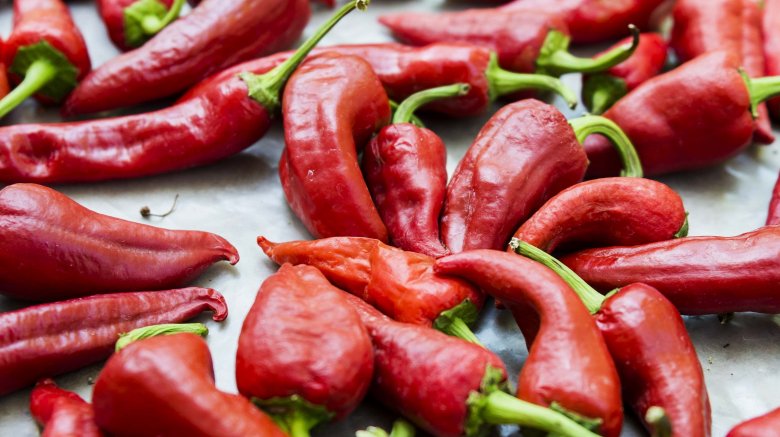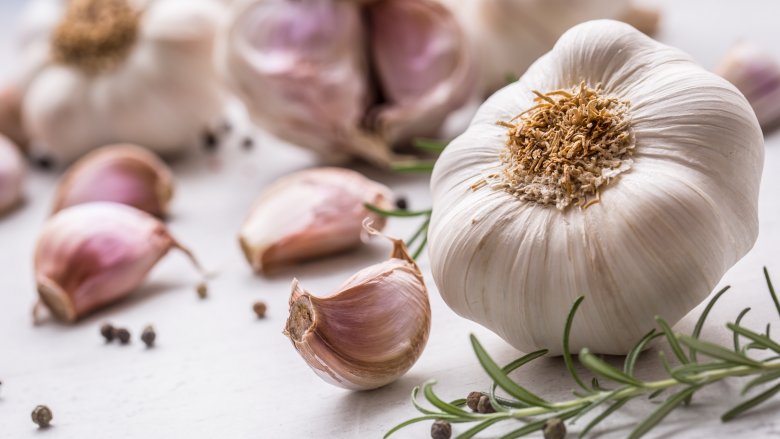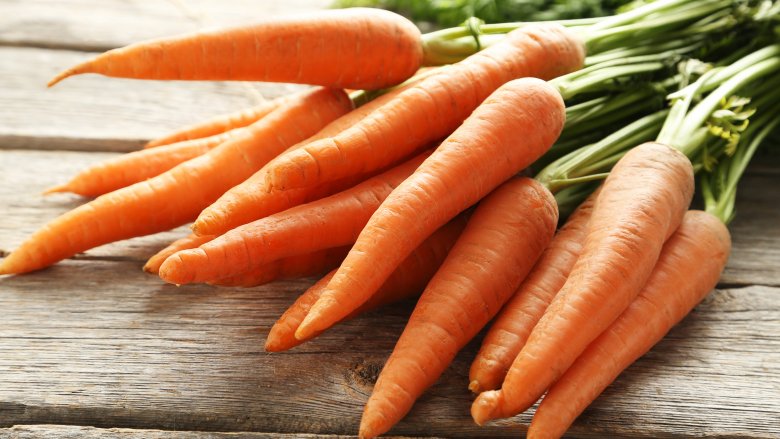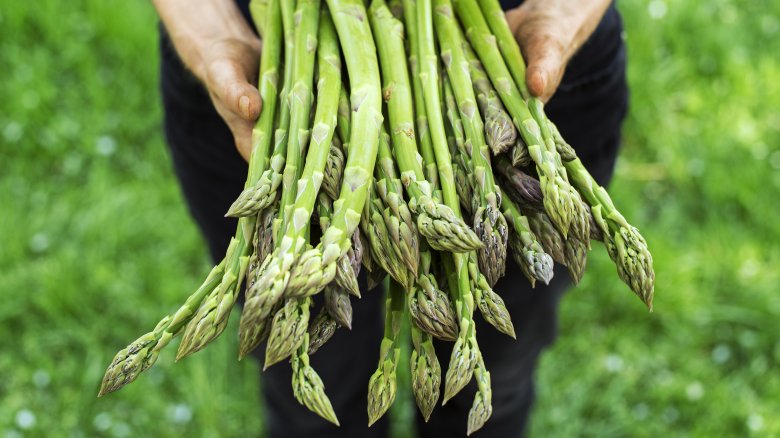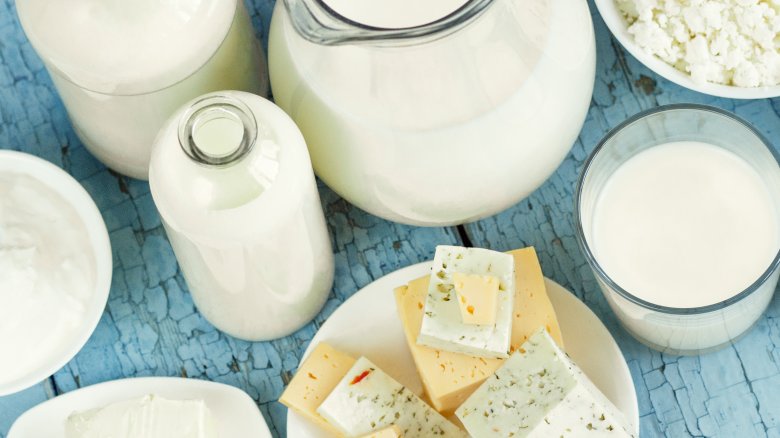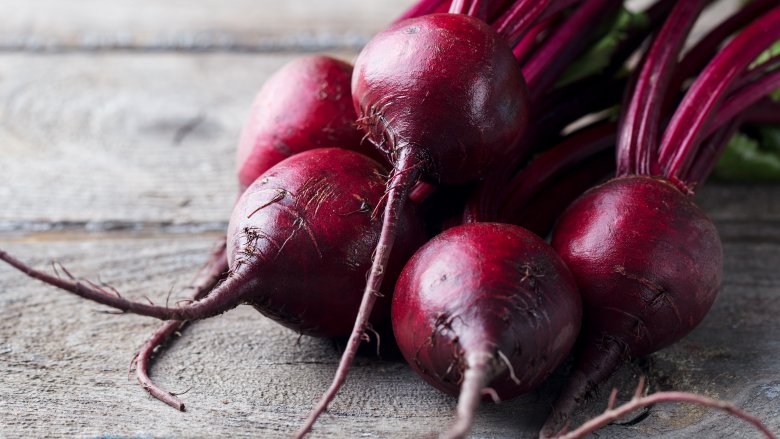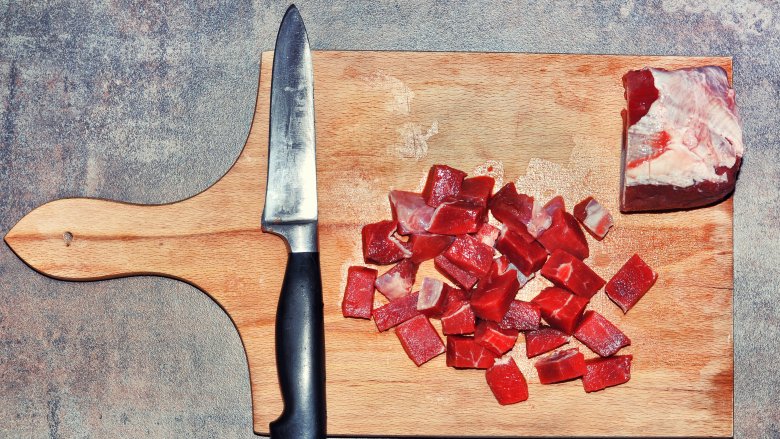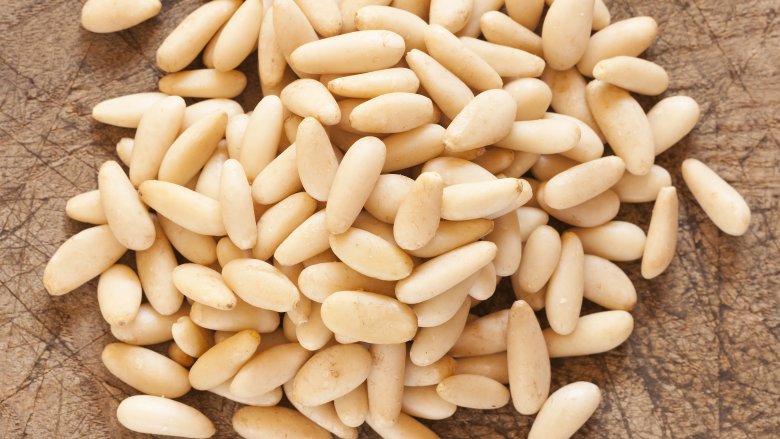Foods That Do Weird Things To Your Body—and Why
Some things are just out of your control. Your dishwasher stopped working, your favorite jersey got a hole in it, and whenever you eat curry for dinner you get crazy weird nightmares about John Waters chasing you with an ax. And while we can't fix your dishwasher or repair your jersey, we can explain why spicy foods give you bad dreams, and why other foods do really weird things to your body too. Have you ever wondered why carrots turn your skin yellow? Or what about why asparagus makes your pee smell funky? If you've ever wondered why garlic and red meat make you smell bad, then you've come to the right place. We're here to cover some of the weirdest things that happen to your body when you eat certain foods. Some of them may have happened to you, while others ... maybe not yet. Curious? Read on.
Spicy foods can give you nightmares
Spicy food is delicious, and for many foodies, the spicier the food, the better it is. We don't suggest cutting spicy foods completely from your diet, but we do recommend you avoid eating spicy foods before bed. Scientific evidence points to spicy foods being the potential instigators of "bizarre and disturbing dreams." This is called food-dependent dreaming, and while science is still a long way from understanding this phenomenon completely, studies do show that there is an increase in vivid, abnormal dreams after a meal containing pungent spices.
Lisa Medalie, a clinical associate of psychiatry at University of Chicago Hospitals, told NBC News, "If our bodies are working hard to digest heavy or spicy foods, it interferes with sleep continuity. We typically advise patients to avoid heavy or spicy foods within [two to three] hours of their bedtime." In other words, if your stomach is feeling iffy, it's more likely that you'll drift in and out of sleep all night, which could influence the bizarre-ness of your dreams and nightmares.
And it's no use trying to quell that burning stomach with loads of milk — those same studies show that dairy might be just as bad (if not worse) at creating nightmares.
Soy reduces sperm count
Soy appears pretty regularly in the average American diet. From cookies to infant formula, to canned meats and soups, soy is present in much of what we eat, whether you know it or not. The widespread use of soy in everyday foods has a myriad of possible side effects, from stomach problems to increased chances of developing breast cancer, but the strangest and most controversial lies in the male reproductive system.
One study published in 2008 looked the association of soy foods with semen quality in 99 male participants. Each participant divulged how much they had eaten of 15 foods containing soy in the three months prior to the study. The results showed that "the higher intake of soy foods...is associated with lower sperm concentration," especially for overweight or obese men.
A review of the study by Harvard Medical School noted that in some cases, "as little as one portion every other day was linked to a reduction in sperm count." They also noted, however, that more studies should be done. So unless fertility is an issue, men can keep eating soy, for now... at their own risk.
Garlic makes your sweat smell worse
On its own, sweat doesn't smell like much of anything. It's not until the sweat comes in contact with the bacteria on the surface of the skin that body odor becomes more noticeable. Especially if you've been eating plenty of raw garlic, people around you are sure to notice
The primary enzyme responsible for the garlic aroma is allicin, an unstable amino acid that morphs into sulfuric compounds when broken down in your body. If you've eaten garlic, this sulfur-like compound will eek through your pores, and make your sweat much smellier. More specifically, it will make your sweat smell like garlic. While this is unfortunate and you probably shouldn't eat garlic before a big date, there is plenty of scientific evidence to support the benefits of garlic in your everyday health.
In the end, if you care about keeping your friends and avoiding a socially offensive odor, we recommend you avoid eating mass amounts of garlic on a hot day. Your friends will thank you.
Carrots turn your skin yellow
Carrots make a perfect, healthy snack, but eating too many of them can do something weird to your body. Believe it or not, eating too many carrots can actually change the color of your skin, a condition aptly named carotenemia. Foods that are high in beta-carotene, such as carrots, will cause a yellow or orange discoloration in the skin pigment, most noticeably found on the palms of your hands. It can take several months for the skin to return to its normal color, and specialists recommend reducing your beta-carotene intake in the meantime.
Other vegetables containing carotene include squash, sweet potato, pumpkin, hot peppers and yams. While the only real danger to an excess of beta-carotene is yellow-tinted skin, an excess of carotene supplements can actually cause adverse affects. Some studies have shown that current or former smokers that regularly took beta-carotene supplements may actually be at an increased risk of lung cancer. In this case, sticking with the real deal definitely makes a difference — yellow skin or not.
Asparagus makes your urine smell weird
You've probably heard the rumors that eating asparagus will make your pee smell weird. So what's up with that? A 2016 study revealed that about 40 percent of the population can actually smell the distinct odor in urine after eating asparagus, but don't worry, the stench isn't harmful. In fact, it's totally normal. Asparagus contains a unique chemical: asparagusic acid. This acid breaks down into sulfuric compounds when digested, and is responsible for the unpleasant odor in your urine.
Interestingly enough, not everyone can smell the change in their urine after eating asparagus. The aforementioned study involved over 6,000 men and women, and results showed that only around 40 percent could detect the strong odor after asparagus intake — the other 60 percent smelled nothing. A large portion of the participants that couldn't smell a thing were women, and researchers are unsure if that's due to women under-reporting the scent, or if women are genuinely less likely to notice it due to their position during urination. Other theories explain that some people may not produce the smell at all.
Milk is killing your complexion
You don't have to be lactose intolerant to experience the negative side effects of dairy. Do you ever suffer from bouts of acne, but have no idea why? Recent studies show that dairy might be the culprit. The reason? Dairy contains hormonal components that influence acne growth, and make the digesting of it hard on your system.
Dermatologist Joshua Zeichner, M.D, explained to Men's Health that acne is basically an inflammatory condition — and it can happen from the inside out. The hormones in cow's milk can cause inflammation when they react to the hormones in your body, causing your skin to produce more oil, which can sometimes lead to acne.
Some dairy is worse than others when it comes to its zit-causing capabilities. According to Zeichner, skim milk is probably the worst offender, though regular milk and ice cream might not do your complexion any favors, either. Yogurt, on the other hand, may actually improve frequency of your breakouts.
Eating beets can turn your urine pink
Beets are the earthy root vegetable packed with nutrients that made Dwight Schrute famous in The Office. And while red beets are successful at boosting energy and brain power, preventing chronic diseases, and delivering valuable nutrients, these magenta root veggies are also notorious for causing dark pink urine and stool — a condition called beeturia, which affects 10 to 14 percent of the population. Beeturia occurs when the body fails to absorb the high amount of red pigments in the beets, and then excretes them into the urine and stool instead.
The good news is that beeturia is usually harmless and hints at nothing more than a minor iron deficiency that can be solved by eating more lean meats, and veggies like avocados or legumes. Other vegetables that can turn your urine pink are blackberries, blueberries and rhubarb, so if they are a regular staple in your diet, don't be alarmed to see a color-change when you hit the bathroom stall.
Eating red meat makes men less attractive
Who knew that eating red meat could make men less attractive to potential partners? A Czech study surveyed two groups of men, one that ate a large portion of red meat for two weeks straight, and one that ate no meat at all. Next, the researchers collected samples of the participants' underarm sweat with cotton pads and asked women to rate each sample on how masculine or attractive the scents were. While the process certainly wasn't pretty, the research does prove that scent plays a large part in sexual attraction. Or, more specifically, that the "odors of donors on the non-meat diet were judged as more pleasant, more attractive, and less intense."
While the specifics of the study are a little gross, sweat isn't the only thing affected by red meat. Gastrointestinal discomfort, like gas and bloating, are also common side effects of red meat consumption, and also contribute to your overall smelliness.
Pine nuts can give you 'pine nut mouth'
Have you ever heard of pine mouth? We've complained about it for years, but science is finally here to confirm that pine nuts really can cause that bitter, metallic taste in our mouths. The exact cause of the condition hasn't yet been determined, but research indicates that certain species of pine nuts originating from parts of China may be to blame. Cases of pine mouth aren't common, but there has been a spike of cases since 2009. Pinpointing the exact type of pine nut that is responsible is difficult, since mixing pine nut species together before packaging is all-too-common. In an effort to cut down on pine mouth cases, China now excludes two of the suspected contributors to the condition from their list of edible nuts, namely species Pinus armandii and Pinus massoniana.
The bitter taste of pine mouth can last anywhere between a couple days and several weeks, and unfortunately, it's made worse when you eat or drink. But don't worry, there are no lasting negative side effects, and won't affect your overall health.

